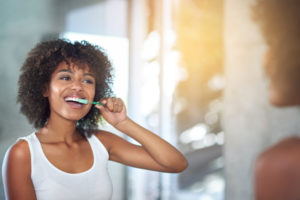Taking proper care of your teeth and gums is paramount to your good health. Not only does a healthy mouth mean you stay healthier overall, but practicing good oral hygiene will also keep you out of the dentist’s chair.
To ensure healthy teeth, brush and floss each and every day. Also, be sure to visit your general dentist at least twice a year for cleanings and exams. When problems are caught early on, they’re much easier to treat.
Daily Oral Hygiene
Brush and floss your teeth twice a day. Most people take time to brush when they get up to eliminate morning breath. While it is important to brush in the morning, it’s even more important to do so before going to bed. You need to remove food particles from between your teeth before sleeping. Otherwise, bacteria will have a full, uninterrupted eight hours to grow on your teeth and gums. When bacteria collects on your teeth, it’s called plaque. And when it’s not removed, plaque will eat into your teeth causing cavities, gum disease and decay.
Brush Properly
Select a toothbrush approved by the American Dental Association. Hold it at a 45-degree angle to your gums and move the brush in small, circular motions on each tooth. Brushing sessions should last at least two minutes. Use a timer if necessary to ensure adequate brushing. Also, make sure you:
- Brush the entire surface of each tooth
- Clean inside the front teeth using the tip of the brush
- Remove bacteria by brushing your tongue as well
Floss and Rinse
Floss at least once a day, preferably at bedtime. This will ensure you’ve removed food particles that have collected between your teeth during the day.
Pull off a strand of floss that’s about 12 inches long. Then, using a sawing motion, thread the floss between teeth. Then curve the floss into a C-shape to remove food particles. If you have difficulty holding the floss, use a floss holder or water pik. People with small mouths find these quite helpful when flossing the back teeth.
You should also rinse your mouth after brushing and flossing. Rinsing removes stray particles that brushing and flossing may have dislodged. Tap water is fine to use, but you can rinse with a store-bought mouthwash without alcohol. Check with your dentist or hygienist to ensure you’re using the right kind for your mouth.
Other Tools
Your dentist may also recommend other things to include in your home oral hygiene routine. For example:
- Interdental brushes
- Rubber tip stimulators
- Tongue cleaners
- Irrigation devices
- Fluoride
- Medicated rinses
Taking good care of your teeth keeps your entire body healthy and helps you avoid restorative dental work. If you need a recommendation for a general dentist or would like more tips for at-home care, please contact our office.

